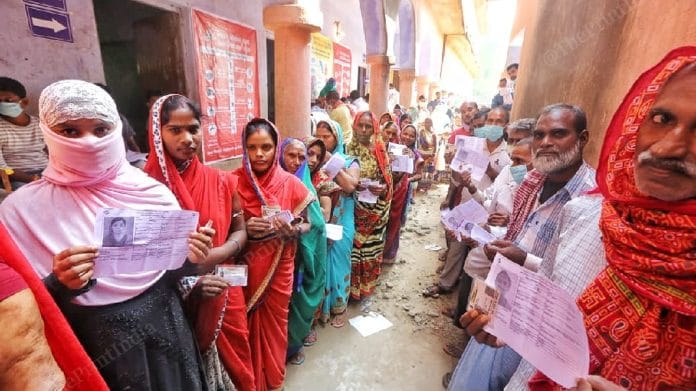Just as the Narendra Modi government’s ‘notebandi’ — the 2016 demonetisation move — finished off lakhs of small and medium businesses in India, the Election Commission’s ‘votebandi’ now threatens to finish off the voting rights of crores of poor and marginalised voters in Bihar.
On 24 June, the ECI announced a special intensive revision of electoral rolls in Bihar, to be carried out over a month. The 3.16 crore voters who were on the rolls as of 1 January 2003 and are still alive will have to re-verify their details. The remaining 4.74 crore voters (not 2.96 crore, as claimed by the ECI) will have to prove their identity and residence status using any of 11 specified documents, such as a birth certificate, Class 10 mark sheet, caste or domicile certificate.
Notably, this list excludes IDs that the poor, especially in rural areas, are most likely to possess, such as Aadhaar, ration card, voter ID, MGNREGA job card, and driving licence. Only 2.8% of Biharis born between 2001 and 2005 possess a birth certificate, according to the government’s National Family Health Survey. Yet bizarrely, younger voters will have to provide further documentation, including their parents’ birth details.
This is a direct attack on democratic rights by the supposed custodian of democracy. Recall the ECI’s response to the Congress party’s questions about the free and fair conduct of the Maharashtra Assembly election last year. It summarily dismissed requests for machine-readable voter rolls. Instead of being transparent, it amended the Conduct of Election Rules to restrict access to CCTV footage and electronic records from voting booths. Now, it has moved from defensiveness to outright assault on voters’ constitutional rights.
Also read: ‘Worst attack’ on Constitution, says Oppn after meeting EC over voter verification drive in Bihar
Bihar voter list revision targets poor
The latest exercise was announced without a shred of consultation with the Opposition. In fact, the ECI itself told an Opposition delegation on 2 July that it expects 20% of voters to be culled from the rolls. Excluding 1.6 crore voters on the eve of an election is a blatantly anti-democratic step.
Consider some basic facts about this perverse exercise:
- The ECI expects to verify 7.89 crore voters in a single month ending on 26 July. This is both insane and infeasible. It is doing so only three months before the likely announcement of the state election, giving unfairly excluded voters no time for legal recourse or appeal.
- Lakhs of Bihari workers spend the summer months working on farms in Punjab, Haryana, western Uttar Pradesh, and other states. How can they be expected to return to Bihar to participate in this last-minute verification drive?
- North Bihar is on the verge of intense flooding during the monsoon, which has already begun. How feasible is it to verify crores of voters whose homes and fields are being inundated or washed away?
- This decision appears tailor-made to prevent the poorest of the poor from exercising their franchise. In Bihar, that predominantly means Dalits, Extremely Backward Castes, and religious minorities. It cannot be a coincidence that this serves the BJP’s electoral interests — even if some of its allies appear uncomfortable about it.
Compare this to the last special intensive revision in Bihar, which was carried out in 2003, a full year before the Lok Sabha election and two years before the next Assembly election. That timeline gave excluded voters enough time to locate necessary documents and pursue legal remedies, if required. Rushing this process through just two months before the election is clearly designed to deny the excluded any recourse whatsoever.
Also read: Clamour for NRC not different from the notion that more Muslims mean threat to Hindu society
Assam NRC playbook for Bihar voters
It is no coincidence that this exercise aligns with Home Minister Amit Shah’s communal rhetoric, disguised as a hardline stance against illegal immigrants. Indeed, the ECI’s original announcement claimed that “inclusion of the names of foreign illegal immigrants” was a key reason for the revision, before this justification was quietly dropped in subsequent statements. Like right-wing populists worldwide, the BJP is hoping to use this tried and tested strategy to stave off looming anti-incumbency and mounting corruption allegations in states like Assam and Bihar.
Consider what happened in Assam, where illegal immigration from Bangladesh has long been a political issue. The 2019 National Register of Citizens (NRC) excluded 19 lakh people, a number far lower than the 50 lakh illegal immigrants once claimed by the Assam government. Yet courts and tribunals in Assam have managed to declare only 30,000 people as foreigners. Of those, just a few hundred have been deported or “pushed back” into Bangladesh by the BJP government.
Clearly, the number of provable illegal migrants is a small fraction of the large number of poor and illiterate people trapped by the NRC process. Why should we expect Bihar, which probably has far fewer illegal immigrants than Assam, to be any different?
The right to vote is the only weapon the poor and the marginalised have in a society marked by inequality, hierarchy, and exclusion. Dominant castes and billionaires may have a disproportionate influence on politicians and policy-making. But the dispossessed have one chance every five years to choose a government that may offer them a better future. The ECI was given constitutional status precisely to protect this right. History will not forgive those currently occupying this office if they betray that responsibility.
Amitabh Dubey is a Congress member. He tweets @dubeyamitabh. Views are personal.
(Edited by Prashant)







No wonder the Congress is hurt and crying. It’s worried about it’s favourite votebank – the illegal Bangladeshi immigrant.